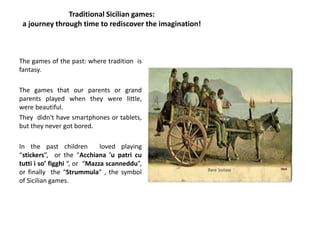This document describes several traditional Sicilian games that were popular in the past, before smartphones and tablets. It discusses the games of "strummula", "Acchiana 'u patri cu tutti ì so' figghi", and "Mazza scanneddu". It provides the histories and rules of these games. It also summarizes the tradition of Sicilian puppet theater, noting that stories were told through handcrafted puppets and helped share culture and bring communities together for entertainment before television.









